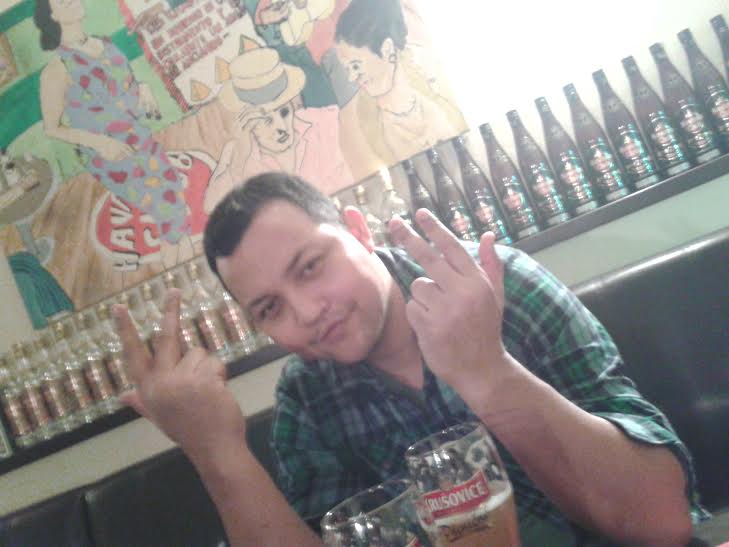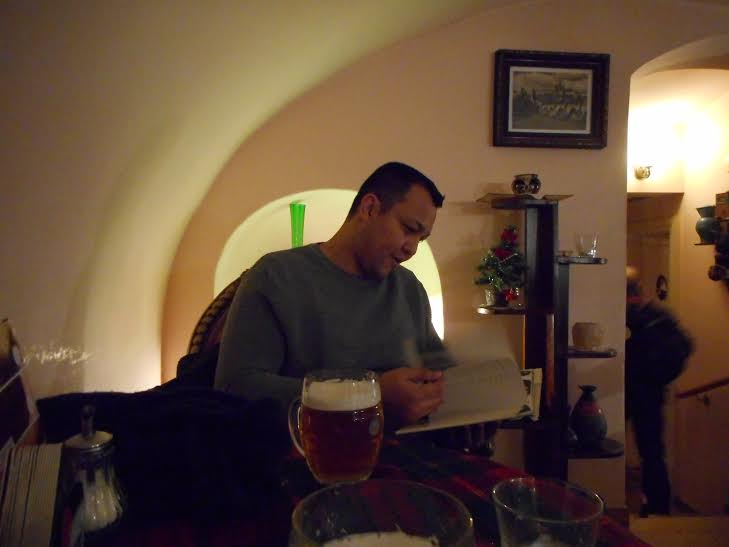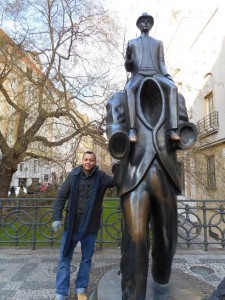The Bucaramanga Giant Who Crossed the Atlantic for Science

 Jhon Alex Rodriguez Buitrago is a Colombian structural biologist who left his country to pursue a scientific career that has already taken him to Spain, Belgium and the Czech Republic. In love with evolution, positivism, Richard Dawkins and biophysical techniques, Jhon Alex talks about his life in the countries with the best beer in the world, strategically chosen for his postdocs, while giving us a critical vision of the political management of research in Latin America.
Jhon Alex Rodriguez Buitrago is a Colombian structural biologist who left his country to pursue a scientific career that has already taken him to Spain, Belgium and the Czech Republic. In love with evolution, positivism, Richard Dawkins and biophysical techniques, Jhon Alex talks about his life in the countries with the best beer in the world, strategically chosen for his postdocs, while giving us a critical vision of the political management of research in Latin America.
How was science education in school?
It all began in Colombia at the age of 6, the age at which most children can be admitted to school. Basically, the school’s task is to teach reading and writing, and to make you love the country with endless semi-military sessions reciting the homeland prayer: “Colombia I take you with love in my heart, I believe in your destiny”, etc. What I remember most is a blow from a first grade teacher because I mixed up the letters S and F in a writing contest. But overall it was a good and pleasant experience because, apart from that teacher, I also had very good ones in Math and Social Sciences. You could define the Colombian public school in my time as Darwinian: “If you finish your elementary school at John F. Kennedy, nothing can stop you.”
When did you become interested in science?
I was always very curious. As a child, I was repeatedly removed from the Presbyterian Church Sunday School, due to my disrespect by questioning the ways of the Lord. I think that when I was twelve years old I already thought the universe was much more complex and required a lot more explanation than what could be obtained with two hours of worship, where my grandmother used to take me three times a week. At that time I was very interested in hunting lizards and opening them with a knife “to see what they had inside”. Of course, my friends, instead of doing that, you can consult a manual of anatomy or zoology. Joking aside, the real interest in science and scientific research is something that I acquired very late, when I was at high school and university.
Why did you choose to study Biology?
To be honest, I wanted to study Medicine, but my entrance exams’ score would not let me, so if I wanted to do it I was to use another strategy. One possibility is to start Biology, get good grades and switch to Medicine, or do both degrees at a time. The good grades never came, but I fell in love with biology, especially the laboratory field (Biochemistry, Molecular and Cellular Biology). I did my specialization in Molecular Biology, and I had a teacher who had the ability to motivate his students. He had done his doctorate in Switzerland and always stressed the importance of a doing a PhD outside Colombia, as in Colombia doctoral training in my time was almost nonexistent.
How do you remember the college years?
The university was one of the best times of my life, both socially (many parties and drunk-philosophical gatherings) and intellectually. The basis of what I am as a person, citizen and professional I obtained it during my Biology degree at UIS (the Colombian institution that I love and will always appreciate for giving me the opportunity to acquire academic education).
Research resources in Colombian universities are scarce. Public university in Colombia does not receive enough to maintain a decent level of research, to the extent that, for example, microscopes donated by the former Soviet Union could be seen in the laboratory. With this I want to emphasize the lack of commitment of Colombian governments with research. The level and the theoretical foundations are very good, but it is well known that a high level of research (type of question you want to answer) requires adequate infrastructure. On the type of students that can be found in a public university as the UIS in Colombia, it is difficult to answer, because there is everything; Ana and Jaime will answer that question better with this song, Tenth Grade:
My concern is the lack of training of some university teachers who do not even have a Masters degree, let alone a PhD, which I think affects the student’s capacity to understand what it means to do research in the real world. It is time for science universities in Colombia to allow a molecular, cellular or structural biologist finish his degree with at least the minimum practical notions of how to function in a laboratory. I mean, you can not get a degree in Biology, specialize in Molecular Biology and never have done PCR, cloning, protein purification, etc. The connection between theory and practice, between academia and the labour market, is missing.
Why did you leave Colombia?
Lack of job opportunities and training. In general, it is more likely for a Congolese to make out at a KKK party than for a molecular/structural/cell biologist to get a job in Colombia.
What differences did you find between science in Colombia and Spain?
In Spain there is a greater commitment to research from the administration, or at least there was when I arrived. I think the big difference is that there are many more resources and opportunities for a science student to develop a scientific career in Spain than in Colombia. For example, when I told my Colombian friends than I got a salary for being a doctoral student, they couldn’t believe it. In Colombia, it is the student who has to pay for his PhD. This creates inequality, since PhD tuition costs are around €8000.
Why did you choose a PhD in Structural Biology?
When I was doing my Masters at the University of the Basque Country I had to do some lab work for my final project. The university provides you with a list of laboratories that might let you work on a project they are carrying out. Rather than structural biology, it struck me the opportunity to work in molecular biology. I wrote several e-mails requesting admission and one of the respondents was a structural biology lab group leader named Oscar Millet, who accepted me in his lab for my Masters project. At the end of my stay, I had decided that I wanted to develop my scientific career in this field. During those months in Dr. Millet’s lab I knew the best partners one can have, Dr. Xavier Tadeo and Dr. David Castaño. At first I was overwhelmed by the theoretical complexity of nuclear magnetic resonance, but after analyzing the practical possibilities of the technique and its applicability to the part of biology that interests me, which is proteins, I decided to do research in protein structure.
My thesis was based on the structural characterization of a protein involved in cancer; which has become one of my fetish proteins, ING5. During my thesis I was involved in a host of biophysical techniques such as circular dichroism, NMR and protein crystallography. This gave me the opportunity to get lab training and practical experience, and as a result of this work our team managed to solve the crystal structure of the N-terminal domain of ING5 (mainly with the help of my teacher and friend Dr. Pietro Roversi). An NMR analysis of the ING5-JADE1L interaction will possibly be published in 2016.
How was your postdoctoral experience?
With no time to celebrate my PhD -obtained on January 21st 2014- I had to pack my bags and make my way to the Free University of Brussels (Belgium). My stay in Brussels was amazing, because I got what I always wanted: intellectual freedom to develop my ideas. The dynamic was simple: my boss worked in Paris at the Pasteur Institute, I worked in Brussels; we met once a month to review the progress of the project and I returned to Brussels to work freely. I applied structural biology techniques to the field of microbiology. I loved this combination, since the information obtained from these two sources (structural and microbiological) has given many results that we are currently arranging for the possible publication of an article which first presents the interaction sites between a protein from Shigella and a human cell receptor. The town is the best: Brussels has an impressive cultural offer, but for a lover of blues and 80s music like me, it’s hard to forget the Monday’s blues in Bizon Bar and the concerts in the Ancient: UB40, Bryan Ferry …
 However, I had to leave Brussels, as the possibility to stay in the project was unclear. I was part of a €13 m budget project called Stopenterics. Unfortunately, I joined the project in the last year, so although our results were very good, it was not certain they could pay me after the end of the project funding by the European Union. I started applying for postdoctoral positions and did a couple of interviews. I could choose between Georgia (USA) and Brno (Czech Republic), and I stayed in Europe. Here in Brno I am comfortable, the Czechs are very friendly and open-minded, and laboratories are equipped with the latest technology in instrumentation (SPR, ITC, MST, NMR, crystallography, SAXS, etc). My project focuses on finding inhibitors for the c-Myc-MAX proteins heterodimer, involved in cancer.
However, I had to leave Brussels, as the possibility to stay in the project was unclear. I was part of a €13 m budget project called Stopenterics. Unfortunately, I joined the project in the last year, so although our results were very good, it was not certain they could pay me after the end of the project funding by the European Union. I started applying for postdoctoral positions and did a couple of interviews. I could choose between Georgia (USA) and Brno (Czech Republic), and I stayed in Europe. Here in Brno I am comfortable, the Czechs are very friendly and open-minded, and laboratories are equipped with the latest technology in instrumentation (SPR, ITC, MST, NMR, crystallography, SAXS, etc). My project focuses on finding inhibitors for the c-Myc-MAX proteins heterodimer, involved in cancer.
What is your overall assessment of your career and of the scientist’s life?
I think I’m on the right track, I managed to acquire many skills that may open the doors to better jobs, but I would have liked to have more publications. I hope these come in the next few years to consolidate a scientific career.
Laboratory work fascinates me; in fact, I confess that I am a little workaholic. I take it personally, which sometimes is not a good idea, especially when experiments do not produce the expected results; I get a bit stressed. Moreover, I consider myself privileged because I work in what I like. The only problem I see is job insecurity; I think it’s one of the cons in our profession. That, and the skills required of postdocs in job advertisements, which increase exorbitantly, while wages and contract length do not.
Interest in science grows in Latin America. There are burgeoning quality research centers, and mediocre universities are being closed. How do you see your future? Will you go back?
Interest in science in Latin America is increasing but at a very slow speed; again my opinion is the lack of a true commitment of Latin American countries to bet on investment in scientific research, which a priori is not very profitable in the short term. At least in countries like Brazil and Argentina they are making some attempts to create platforms for scientific production. The case of Colombia is very particular: the strategy is to send professionals abroad to be trained -do PhDs in Europe and the US-. The problem is, if we return, we find few opportunities, focused mainly on teaching, but not research. I am not optimistic about the future. There should be a pro-scientific revolution in Colombia, and that didn’t happen so far, I think, due to the lack of people awareness about the importance of research in a society that is part of a globalized -and thus competitive- world . Will I go back? Actually, I’d like to; now here in the Czech Republic is -17 ºC. I miss the Colombian warmth, but I’d go back for high-level research, not just for teaching.
